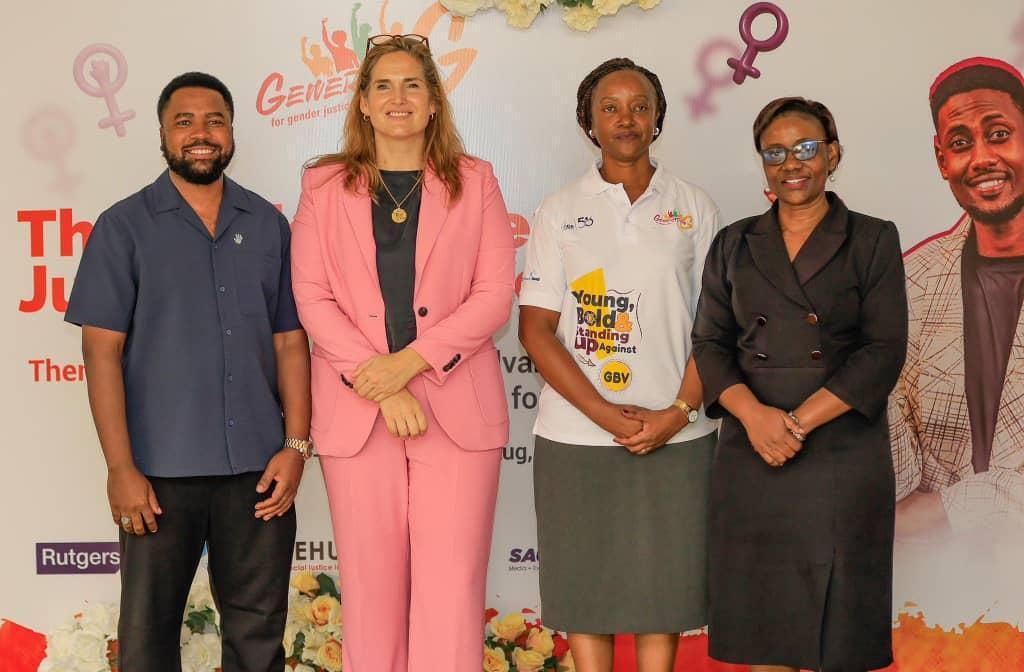Africa-Press – Uganda. On Thursday, leaders, youth advocates, and development partners gathered at Golf Course Hotel in Kampala to mark the success of the five-year Generation Gender project, during the National Gender Justice Dialogue 2025.
The event brought together a consortium of partner organisations, including FIDA Uganda, CEHURD, and Reach A Hand Uganda (RAHU), supported by Sonke Gender Justice, Together!, and the Kingdom of the Netherlands.
With the theme “Reflecting on progress, advancing gender justice: Amplifying voices for change”, the day served as both a celebration of achievements and a reflection on the road ahead for gender equality in Uganda.
Speaking to the media, Lilian Byarugaba, Executive Director of FIDA Uganda, spoke of the consortium’s work in six districts; Kapchorwa, Kween, Adjumani, Namayingo, Iganga, and Bukwo, emphasising community-led advocacy as central to the project.
“We have bylaws at grass root level that have been enacted to address key cultural barriers that were originally a hindrance to the progressive realisation of gender equality. We also see more youth taking on leadership positions at different levels,” she shared.
Ms. Byarugaba also called attention to the need for better policy enforcement.
“Our main challenge as a nation remains the enforcement of existing policies… So we see an opportunity for government to increase funding towards the enforcement of existing laws,” Byarugaba said
Looking ahead, she expressed hope that structures put in place such as trained community legal volunteers and government officers, would sustain the work beyond the project’s lifetime.
*Youth at the Forefront*
In his speech, Humphrey Nabimanya, Executive Director of Reach A Hand Uganda, praised the youth for taking up leadership roles and driving accountability within their communities.
“One of the peer educators mentioned to me that ‘if it’s not me, then who? And if it’s not now, then when?’ These are sentiments that resonate deeply with our advocates who are taking action today,” he noted.
He highlighted several major wins, including youth summits, consultative dialogues, and collaborations with cultural institutions.
“We have also gone ahead to engage the Buganda, Busoga, Sebei, and Rwenzururu Kingdoms… It has been an instrument in challenging harmful social norms and practices that hinder gender justice.”
He added that the work in districts like Adjumani has inspired others: “Tooro Kingdom has invited us also to be on the table…These are not inspirations coming just from a project, but from your support.”
Fatia Kiyange, Executive Director of CEHURD, applauded the achievements made and called for stronger investment in gender justice systems, including legal and psychosocial support.
“Gender justice goes beyond addressing violence against women; it also includes tackling violence against men,” she said.
“We need increased opportunities for youth employment and safe shelters for survivors of gender-based violence.”
She reinforced the importance of building strong partnerships with communities, government bodies, and international allies.
The Guest of Honour, Frederieke Quispel, Ambassador of the Kingdom of the Netherlands to Uganda, commended the work of the consortium partners and acknowledged the importance of collaborative approaches.
“These are not small wins. They’re systemic transformation driven by people who understand their communities, their needs, and the urgency of justice,” she said, referring to milestones such as youth-friendly health centres and cultural reforms.
She praised the Gender Justice Innovation Hubs as “pioneering examples of how technology, law, and community engagement can create inclusive learning spaces for rural youth.”
However, Ambassador Quispel raised concerns over shrinking civic space: “This project courageously opened up digital and physical spaces for mobilisation, dialogue, and learning… We need to keep engaging young people. Don’t judge them, talk to them. Engage them.”
Dr Patricia Odong, a keynote speaker, urged Ugandans to stay committed to the cause. “This event is not only a celebration but also a moment to reflect on ongoing gender injustices,” she said.
Referencing Sustainable Development Goal 5, she affirmed that gender justice is “possible when efforts are both intentional and inclusive.”
The National Gender Justice Dialogue 2025 was a moment of unity and shared purpose, shining a light on how grassroots empowerment, youth leadership, and cultural transformation can advance gender justice in Uganda.
The dialogue reaffirmed that, while the Generation Gender project may be ending, the movement for gender equality is far from over.
For More News And Analysis About Uganda Follow Africa-Press






